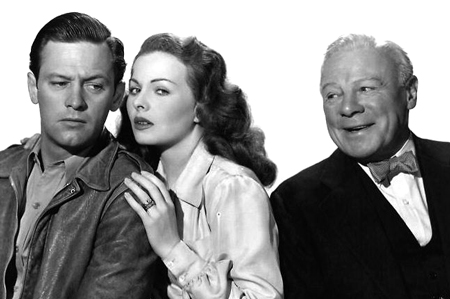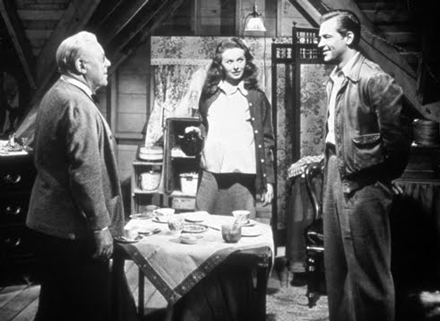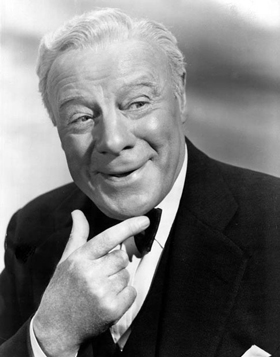
 |
|
|
|
Comedy writer, playwright and movie director George Seaton enjoyed a long run of film hits, many with his producing partner William Perlberg. His directing was never as forceful as his writing, and his writing too often settled for easy emotional connections with his audience. Seaton is the sole credited writer on the masterful The Song of Bernadette, yet nothing in his filmography can match Henry King's direction or Jennifer Jones' leading performance. Seaton instead made his mark with a number of audience-pleasing favorites, like the warm-hearted Christmas classic Miracle on 34th Street. Two of Seaton's most popular successes haven't aged as well. The Country Girl wallows in maudlin self-pity, and the light comedy Teacher's Pet only pretends to have anything relevant to say about the social responsibilities of journalists and teachers. The values in Seaton's films also come into question. 1950's The Big Lift begins as a thoughtful story of American airmen meeting possible romantic partners in Berlin. To serve the film's military-approved message, the women they find are limited to a flag-waving lover of democracy and a conniving opportunist. Miracle on 34th Street celebrates the true spirit of Christmas beyond materialism. Yet at its finish a happy family is granted a 'magical' house out of nowhere, just for believing in Santa Claus. 1948's Apartment for Peggy is a feel-good romantic comedy that takes a real postwar problem as its starting point. Many veterans attending college on the G.I. Bill were forced to live like paupers, practically camping out around college campuses. Although the Bill directed that housing be made available for the veterans and their young wives (a title card quotes the statute), supply couldn't keep up with the demand. Rather than address the issue, Seaton's film quickly turns into a romantic fairy tale with a soggy, sentimental core. 
Retired philosophy professor Henry Barnes (Edmund Gwenn) has calmly decided that his usefulness is at an end, and has decided to commit suicide. Henry's faculty friends rally to plead and reason with him, to no avail. That's when Henry meets Peggy (Jeanne Crain) the 19 year-old bride of a penniless chemistry student on the G.I. Bill, Jason Taylor (William Holden). With no more housing available on the snowbound campus, the Taylors are freezing in a tiny trailer. When the outspoken Peggy discovers that Henry has an unused attic, she dismisses his objections and starts moving in. The noise interrupts Henry's work, but Peggy ignores his complaints and brings a dog into the house without his permission. Affection grows between the professor and his new tenants, especially when Peggy announces that she's carrying a baby. The new responsibility and a personal tragedy convince Jason to break off his studies and take a job selling cars. Peggy must find a way to get him back in school before his professors write him off. Meanwhile, old Henry has been saving up sleeping pills. With his book finished, he's once again intent on doing himself in. Brightened by personable performances, Apartment for Peggy is a moderately likeable light drama that doesn't look too deeply at its own postwar subject matter. Our boys in uniform are back from fighting and with Uncle Sam's help are trying to catch up with their educations. William Holden's Jason is a responsible guy who wants a good life. Interestingly enough, he's the weak link in the marriage, always doubting his choice to get that chemistry degree and become a teacher. He's too easily tempted by the sales job, which in the screenwriter's estimation represents the worst kind of self-betrayal. When push comes to shove, the kindly professors conspire to help Jason retake the qualifying exams to resume his studies. Thanks to Peggy's lobbying, he is given the same special breaks once reserved for dunderheaded football players in old 'college spirit' comedies. The dominant personality here is Peggy, the aggressive postwar woman who wants it all -- marriage, successful husband, happy family. She won't stop talking until she gets it. 1948 is the key year for this trend, with Betsy Drake in Every Girl Should Be Married serving as the prime example of the nervy and demanding "new woman" unwilling to wait meekly for her Prince Charming to come along. Peggy Taylor doesn't let the befuddled old professor get a word in edgewise, and when he offers to put in a good word on her behalf she lays siege to the housing office. Peggy is more than just a squeaky wheel, she's a smiling enforcer of good cheer, determined to get her way. 
Peggy's way is proven to be the right way for all concerned. Professor Henry's colleagues waggle their fingers at him and worry themselves sick, but only the nervy Peggy can goad the old man into feeling that his life has value. Never mind that he's a noted philosopher, as the movie implies that too much logical introspection can be unhealthy. Peggy energizes Henry with the simple thought that what he calls 'living' is just getting by. If he's to appreciate life he must live it 'in the now', as she does. Henry's primary therapy comes about when Peggy's fellow wives in the laundry room express dismay that they cannot carry on intelligent conversations with their student husbands. Peggy enlists Henry to lecture the girls in basic philosophy. He meets with success, but the subplot backfires by reinforcing the film's idea that higher education is for men only. 1948 was not the Dark Ages for co-ed education, yet none of these intelligent women is interested in any career role beyond housewife. At the very least, the brilliantly organized Peggy should be running a corporation. The movie's most serious event occurs when Peggy's pregnancy runs into trouble. The development is exploited for its sentimental value, and to spur Jason to withdraw from his classes. We never find out if the harsh conditions forced on the student wives was a contributing factor -- to save money, Peggy wasn't taking vitamin pills. Peggy naturally bounces back, undaunted and stronger than ever. The superficially charming Apartment for Peggy is only masquerading as a problem movie. The problems are either not convincing, or too easily surmounted. A bright personality is the cure for all ills. The "suicide at Christmas" theme also does not ring true. Henry is obviously not the irrelevant dotard he claims to be, and he isn't an isolated ideologue that might make suicide as a philosophical choice. What retired professor could be more active? Henry has plenty of good friends on the faculty, with whom he plays the violin in weekly informal get-togethers. He's finishing a new book. He is not morbidly depressed over being a widower, or having lost his only son to the war. In context, Henry's decision to do away with himself comes off as a screenwriter's trick, yet another eccentric mannerism to make Henry more interesting. Seaton uses the comic resolution of Henry's pill hoarding as the final throwaway joke in a movie that begs our emotional engagement, yet trivializes its every dramatic problem. 
George Seaton's Miracle on 34th Street made an Oscar-winning star of the 71-year-old Edmund Gwenn. He had been in films since 1916, often playing officious clerks and stern authority figures. But the last ten years of his career saw him specialize in sentimentalized old men of wisdom. At this point in his career William Holden hadn't yet established himself despite an auspicious beginning eight years earlier in Golden Boy and Our Town. It would be two more years before Holden's career took off in Billy Wilder's Sunset Blvd. He'd work with George Seaton again in the well-received 1962 thriller The Counterfeit Traitor. Star Jeanne Crain's bright face and earnest attitude enlivens any number of pictures. She received good film roles almost from the beginning, and remained an audience favorite even as major stardom proved evasive. In pictures like State Fair and Margie she's the healthiest all-American girl one can imagine, but she also had the acting skill to pull off touchy assignments like Pinky and People Will Talk, where she plays an unmarried mother. Apartment for Peggy requires Ms. Crain to prattle on incessantly and still remain likeable. Audiences in 1948 accepted the character without complaint. 
The 20th Fox Cinema Archives DVD-R of Apartment for Peggy is a lackluster disc that will disappoint collectors. The film screens in much better condition on the studio's cable channels. Part of Fox's Made-On-Demand disc program, this release has been mastered from a tape source that could not be newer than the early 1990s. Colors are dull and the picture is dark overall. The entire image exhibits an overlay of video scan lines that look like bad TV reception from the days of rabbit ear antennas. It cannot be recommended. It's unlikely that Fox Cinema Archives will generate repeat customers when so many of their discs are of inferior quality. Their new MOD disc of the Edward Dmytryk western Warlock, for instance, is an ancient pan-scan transfer even though the Amazon incorrectly lists it as 2:35. Fox released a very good enhanced CinemaScope DVD in 2005.
On a scale of Excellent, Good, Fair, and Poor,
Apartment for Peggy rates:
Reviews on the Savant main site have additional credits information and are often updated and annotated with reader input and graphics. Also, don't forget the 2011 Savant Wish List. T'was Ever Thus.
Review Staff | About DVD Talk | Newsletter Subscribe | Join DVD Talk Forum |
| ||||||||||||||||||